Imagine this: you run a growing online store. Orders are coming in fast, customers are asking questions on multiple channels, your sales team is following up with leads, and your marketing team is running campaigns. But instead of working together, your data is scattered across spreadsheets, email threads, and sticky notes on desks. At some point, opportunities get missed, customer relationships slip through the cracks, and growth slows down. That’s exactly what Customer Relationship Management (CRM) software is designed to fix. A good CRM keeps everything organized, from tracking interactions and managing leads to boosting sales and automating repetitive tasks — so you can focus on building lasting customer relationships.
Think of how Amazon suggests products you’re likely to buy or how Airbnb sends trip reminders — both powered by smart CRM systems. Today, companies of all sizes rely on CRMs to stay competitive and deliver personalized experiences. But here’s the challenge: with so many CRM software companies offering dozens of platforms, how do you pick the one that truly fits your business? The reality is, not every business can thrive on a one-size-fits-all solution. This is where custom CRM software steps in, giving organizations the flexibility to design tools around their unique processes.
What You’ll Find in This List
The variety of CRM tools today can make the selection process overwhelming for many businesses. To help, we’ve put together this list of the Top 10 CRM Software Solutions for 2025, covering:
- A quick overview of each platform
- Key features and highlights
- Best-fit industries or business types
- Pricing insights (where available)
- What makes each tool unique
This way, you’ll get a clear comparison to find the best CRM software for your business needs — without the guesswork.
What is CRM Software and Why Do Businesses Need It in 2025?
Customer Relationship Management software is a tool that helps businesses organize and manage all their customer interactions in one place. Instead of juggling spreadsheets, emails, and multiple apps, a CRM system centralizes everything — contacts, conversations, sales pipelines, and even support tickets.
But in 2025, CRM is not just a tool for keeping customer records. Modern CRM Software enables businesses to:
- Track every lead and sales opportunity with ease
- Automate repetitive tasks like follow-ups and reminders
- Personalize customer experiences based on behavior and history
- Generate insights through analytics and reporting
- Align sales, marketing, and customer service teams on one platform
Not every business works the same way. Some need a CRM mainly for tracking sales, while others rely on it to manage customer support or marketing campaigns. That’s why a one-size-fits-all CRM doesn’t always deliver the best results.
This is where custom CRM software makes a difference. Instead of forcing your team to adjust to rigid tools, a custom solution adapts to your processes, industry, and goals. Whether you run a small startup or a growing enterprise, working with an experienced CRM software development company can help you build a system that fits your business today and scales with you tomorrow.
Top 10 Custom CRM Software Solutions to Try in 2025
With so many CRM platforms available, it’s tough to know which ones actually deliver value. Some focus on sales, others on marketing, while a few offer complete end-to-end solutions. To save you time, we’ve shortlisted the 10 best CRM software solutions in 2025 — covering their features, pricing, ideal business fit, and what makes each stand out.
1. Salesforce CRM
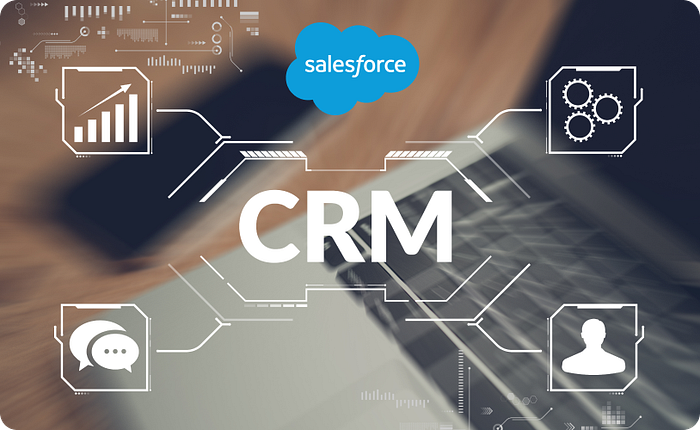
Overview
Salesforce is one of the most widely recognized names in customer relationship management software. It’s trusted by businesses ranging from startups to Fortune 500 companies for its flexibility, scalability, and huge ecosystem of apps. With powerful tools for sales, service, marketing, and analytics, Salesforce acts as a complete digital hub for customer management. In 2025, its AI-driven insights and automation features make it a go-to platform for businesses that want to stay ahead of the curve.
Key Features
- AI-powered insights with Einstein AI
- Advanced lead and pipeline management
- Customizable dashboards and reporting
- Integration with thousands of third-party apps
Best For
Large and mid-sized businesses looking for a highly scalable, customizable CRM.
Pricing
Starts at $25/user/month (Essentials plan); advanced plans scale up depending on features.
Why It Stands Out in 2025
Its AI-driven automation and huge app marketplace make Salesforce a top choice for businesses that want a future-ready CRM.
2. Microsoft Dynamics 365
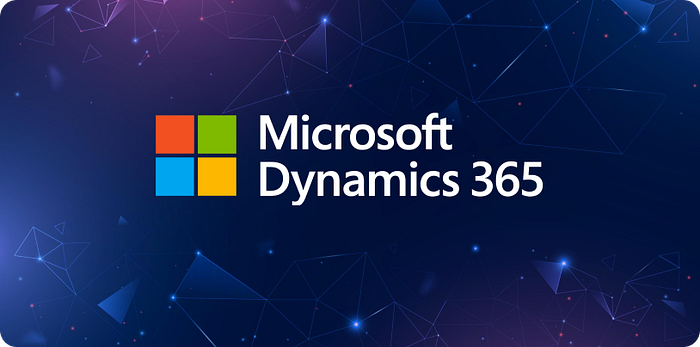
Overview
Microsoft Dynamics 365 brings CRM and ERP together into one powerful solution, helping businesses connect sales, customer service, finance, and operations. Its strong compatibility with Microsoft apps such as Outlook, Teams, and Office 365 makes it a natural fit for businesses relying on Microsoft products. Companies benefit from a 360° view of customers, predictive analytics, and industry-specific modules that scale with growth. For enterprises seeking a unified approach, Dynamics 365 is a strong contender in 2025.
Key Features
- 360° view of customer interactions
- Built-in AI and predictive analytics
- Native integration with Microsoft Teams and Outlook
- Scalable modules for different departments
Best For
Enterprises and businesses are already within the Microsoft ecosystem.
Pricing
Starts at $65/user/month (Sales Professional); pricing varies by module and usage.
Why It Stands Out in 2025
Dynamics 365 bridges sales, marketing, and operations seamlessly, making it one of the most versatile CRMs for large organizations.
3. HubSpot CRM
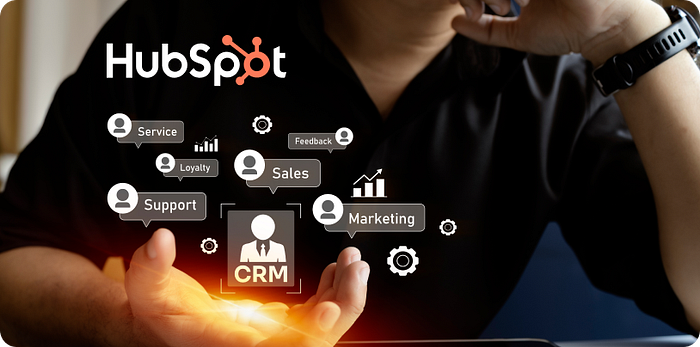
Overview
HubSpot CRM has become a favorite among small and mid-sized businesses thanks to its simple interface and strong marketing tools. It’s one of the few platforms that offers a robust free version, making it easy for companies to get started. Beyond sales pipeline tracking, HubSpot connects marketing, service, and content management into a single platform. In 2025, it continues to shine as a cost-effective and user-friendly solution for growing businesses.
Key Features
- Free CRM with core sales and contact management
- Email tracking, meeting scheduling, and live chat tools
- Marketing automation with HubSpot’s Marketing Hub
- Intuitive dashboard for pipeline visibility
Best For
Startups and SMEs looking for a free or low-cost CRM that’s easy to scale.
Pricing
Free plan available; paid plans start at $25/month (Standard: $25).
Why It Stands Out in 2025
Its balance of affordability, ease of use, and powerful marketing tools makes HubSpot one of the most popular CRMs globally.
4. Zoho CRM
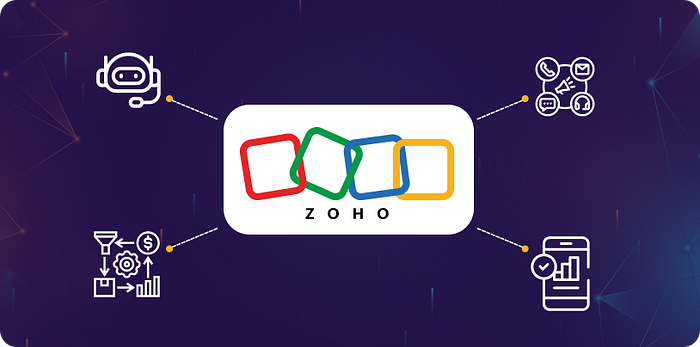
Overview
Zoho CRM is known for delivering powerful features at an affordable price point, making it especially popular among startups and SMBs. With more than 250,000 businesses worldwide using it, Zoho has built a reputation as a flexible, budget-friendly CRM. It offers AI-powered insights, omnichannel communication, and smooth integration with Zoho’s suite of 40+ business apps. In 2025, it stands out as one of the best CRMs for businesses that want advanced capabilities without enterprise-level costs.
Key Features
- AI assistant (Zia) for predictions and insights Omnichannel communication (email, phone, chat, social)
- Workflow automation for sales and marketing
- Strong integration with Zoho’s 40+ business apps
Best For
Small to medium businesses that want powerful features at an affordable cost.
Pricing
Free plan for up to 3 users; paid plans start at $14/user/month.
Why It Stands Out in 2025
Zoho combines affordability with flexibility, making it one of the best choices for growing companies on a budget.
5. monday.com CRM

Overview
monday.com offers a visually intuitive CRM that makes managing pipelines simple. Originally built for project management, its CRM module now allows teams to track leads, automate workflows, and collaborate more effectively. With drag-and-drop boards and flexible customization, it’s especially useful for teams that value simplicity and transparency.
Key Features
- Visual, drag-and-drop pipeline management
- Easy workflow automation
- Collaboration and project management tools
- Customizable dashboards and templates
Best For
Teams looking for an easy-to-use, visual CRM with project management features.
Pricing
Free for up to 2 seats; paid plans start at $9/seat/month.
Why It Stands Out in 2025
monday.com blends CRM and project management, making it a flexible choice for modern teams.
6. Pipedrive
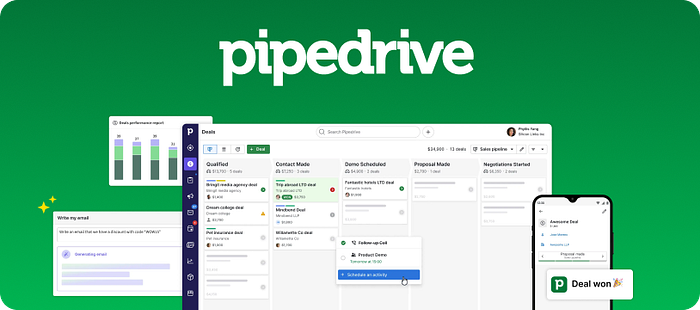
Overview
Pipedrive is a sales-focused CRM that helps teams stay on top of pipelines and close deals faster. Its simple, intuitive interface makes it easy to use, while automation features help with follow-ups and reminders. It’s a favorite among sales teams that want to keep things straightforward and effective.
Key Features
- Visual pipeline management
- Sales forecasting and reporting
- Workflow automation for follow-ups
- Integrations with popular business tools
Best For
Sales-driven teams looking for a straightforward CRM.
Pricing
Plans start at $14.90/user/month.
Why It Stands Out in 2025
Pipedrive simplifies CRM for sales teams, focusing on usability and efficiency.
7. Oracle CRM (CX Cloud)
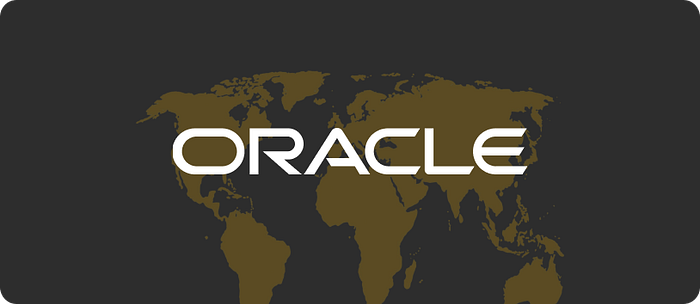
Overview
Oracle CRM (CX Cloud) is built for enterprises that need advanced tools for sales, marketing, and customer service. It uses AI to deliver insights, improve customer journeys, and automate complex workflows. While it requires expert setup, its scalability and advanced features make it a strong solution for large organizations.
Key Features
- AI-driven sales insights and automation
- Omnichannel customer engagement
- Deep reporting and analytics
- Strong enterprise-grade security and customization
Best For
Large enterprises need advanced, AI-driven CRM capabilities.
Pricing
Custom pricing; typically higher than SMB-focused CRMs.
Why It Stands Out in 2025
Oracle CRM delivers enterprise-level customization and AI capabilities for complex organizations.
8. Freshsales (Freshworks CRM)
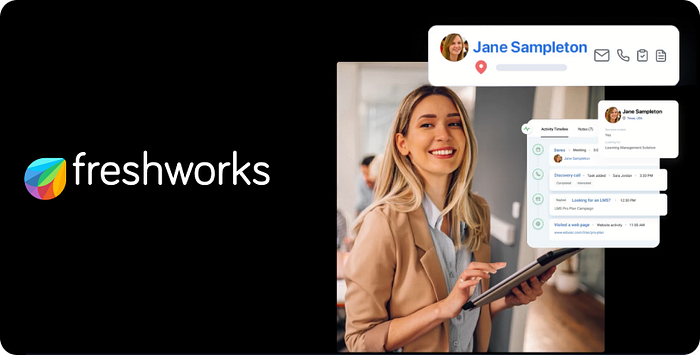
Overview
Freshsales, part of Freshworks, is designed for growing businesses that need an easy-to-use CRM. It comes with built-in communication tools, customizable pipelines, and AI-based deal insights. Quick to set up and affordable, it helps teams engage leads and customers without complexity.
Key Features
- Built-in phone, email, and chat integration
- Freddy AI for lead scoring and insights
- Customizable sales pipelines
- Automated workflows
Best For
Small to medium businesses seeking an affordable, easy-to-use CRM.
Pricing
Free plan available; paid plans start at $15/user/month.
Why It Stands Out in 2025
Freshsales combines affordability with intelligent features, perfect for growing businesses.
9. Zendesk Sell
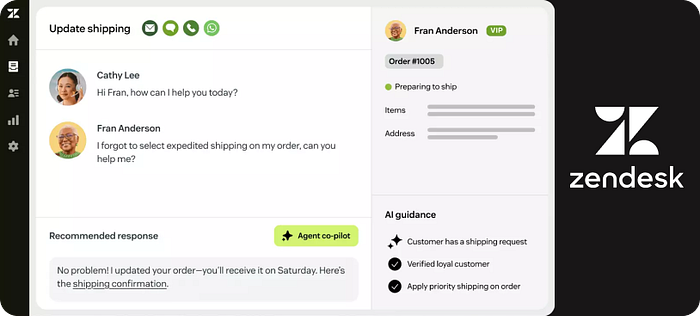
Overview
Zendesk Sell is a sales-focused CRM that complements Zendesk’s popular customer support tools. It helps sales teams improve productivity with streamlined lead management, pipeline tracking, and strong reporting features. With native integration into Zendesk Support, it’s a solid option for companies that prioritize both sales and service.
Key Features
- Sales pipeline and lead management
- Automated email tracking and reminders
- Strong reporting and analytics
- Integration with Zendesk’s customer support tools
Best For
Companies already using Zendesk for support and looking to align sales with service.
Pricing
Plans start at $19/user/month.
Why It Stands Out in 2025
Zendesk Sell bridges the gap between sales and support, creating a unified customer experience.
10. Bitrix24
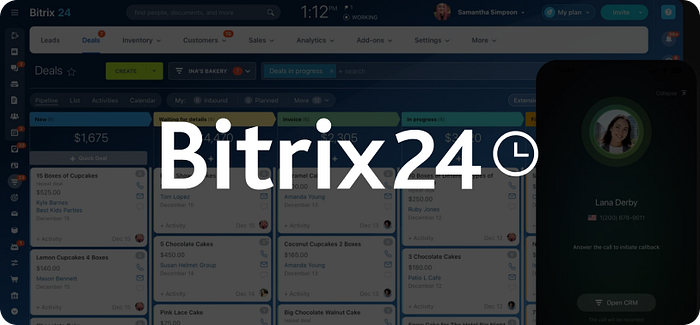
Overview
Bitrix24 is more than just a CRM; it’s a full business management suite. Along with CRM features, it includes project management, communication tools, and even HR functions. Bitrix24 comes in both cloud and self-hosted versions, offering flexibility to suit different team requirements.
Key Features
- CRM with integrated project management
- Omnichannel communication tools
- Collaboration and task management
- Cloud and on-premise options
Best For
Companies that want an all-in-one business management platform.
Pricing
Free plan available; paid plans start at $61/month for small teams.
Why It Stands Out in 2025
Bitrix24 combines CRM, collaboration, and project management in one platform.
How to Choose the Right CRM Software for Your Business
The best CRM software is not the one with the most features or the biggest reputation; it’s the one that matches your business perfectly. The truth is, a CRM that works wonders for an eCommerce startup might be completely wrong for a B2B enterprise. So before you sign up for demos and free trials, here are some key steps to make the right choice:
1. Start With Your Goals
Ask yourself: What problem am I trying to solve with a CRM?
- Is it managing leads more effectively?
- Automating repetitive sales tasks?
- Giving your support team a single view of the customer? Knowing your goals upfront prevents you from paying for fancy features you don’t really need.
2. Think About Scalability
A CRM should grow with your business, not hold you back. If you’re a small business today, you may only need simple contact management. But in two years, you might need advanced analytics, AI insights, or multi-channel marketing. Look for a system that can scale without forcing you to start over.
3. Check Integrations With Your Current Tools
A CRM should make your life easier, not harder. Make sure it connects seamlessly with the tools you already use:
- Email (like Gmail or Outlook)
- Communication apps (Slack, Microsoft Teams)
- Marketing tools (Mailchimp, HubSpot, Google Ads)
- Accounting/ERP systems, if you’re scaling fast
Smooth integration means your team doesn’t waste hours copying data between systems.
4. Balance Features With Ease of Use
Some CRMs look powerful on paper, but end up being so complex that your team avoids using them. The best CRM software is the one your team actually enjoys using daily. Test out the user interface, mobile app, and automation setup during a free trial before committing.
5. Decide Between Ready-Made vs. Custom CRM
Off-the-shelf CRMs (like HubSpot or Zoho) are fast to set up and usually budget-friendly. But if your workflows are highly unique or you’re in a specialized industry, custom CRM software built by a CRM software development company might save you headaches in the long run. It adapts to your processes, instead of forcing you to change them.
6. Look at Pricing — But Don’t Be Trapped by It
Many businesses make the mistake of chasing the cheapest plan. Instead, focus on value for money. Sometimes paying a little more for better automation, AI insights, or integrations can unlock much bigger returns.
The right CRM software doesn’t just manage contacts; it helps you build better relationships, close more deals, and grow faster. If you take the time to match your goals, team size, and budget with the right platform, your CRM won’t just be another tool; it’ll become the backbone of your business growth.
Read this full blog here: https://www.logicspice.com/blog/top-10-custom-crm-software-2025
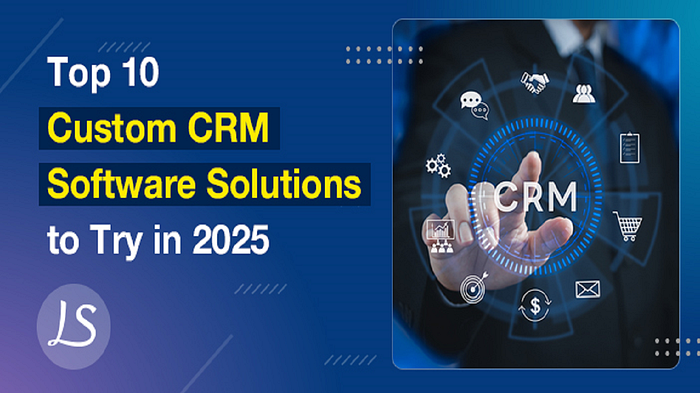
Comments
Post a Comment